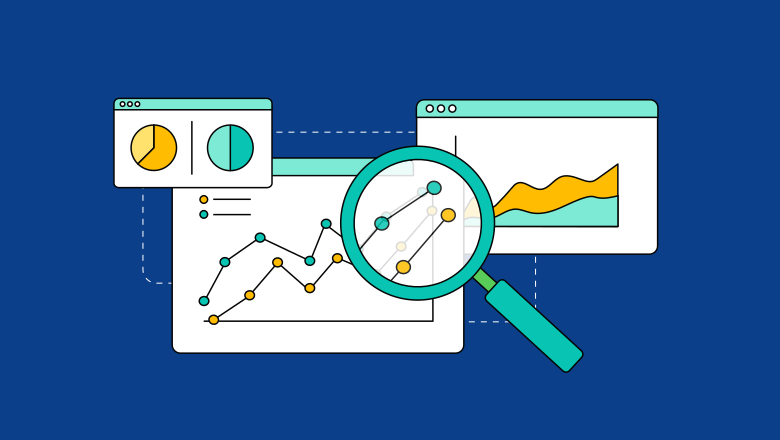Competitive intelligence (CI), or thorough information about your rivals and how your firm compares, is essential for every business to thrive in the fast-paced, constantly changing market environment of today. By tracking rival activity, competitive intelligence tools give you the knowledge you need to develop a competitive edge. It allows you to take advantage of fresh possibilities, see possible dangers before they materialize, and make wise choices at every stage.
The main issue is the enormous quantity of data that has to be collected and examined. Complete competitive intelligence requires the ability to obtain information from hundreds of web sources. Without the proper technology to assist the process, this is not conceivable.
Popular Competitive Intelligence Tools

1. Semrush
With more than 40 competitive intelligence tools, backlink analysis, rank tracking, technical SEO, and keyword research, Semrush is an all-in-one digital marketing platform. Because Semrush offers the largest database—more than 25 billion keywords, 43 trillion backlinks that are crawled every day, and more than 808 million domain profiles that you may examine—it is the most dependable tool available.
Additionally, Semrush offers a specific suite of tools for analyzing competitor websites that allow you to examine every facet of your rivals’ online presence. Specifically, you may compare the traffic to your website to that of your rivals, find keywords that your competitors rank for but you don’t, examine the advertisements and social media activity of competitors, and much more!
The Organic Research Competitors report is a popular favorite because it allows you to quickly see how you stack up against your rivals, examine their organic traffic, and examine the keywords that help them get visitors from organic search results.
Features:
- Web Tracking.
- Monitoring.
- For PPC Campaigns.
- Multi-Campaign.
- Dashboard.
- Backlink Monitoring.
- Benchmarking.
- Conversion Tracking.
- Activity Tracking.
- Post Scheduling and many more.
Price:
- Pro: $139.95/month.
- Guru: $249.95/month.
- Business: $499.95/month.
2. Ahrefs
Another of the well-liked SEO competitive intelligence tools available is Ahrefs. It was first created as a tool for backlink analyzing. Nevertheless, Ahrefs now provides a number of competitive research tools, including backlink, keyword, content gap analysis, domain overview, and organic competitor overview, to mention a few.
The Organic Pages report, which is based on user experience, is very useful when doing a competition study. This report may be used to spy on the top traffic-generating sites of rivals, as well as the quantity and location of ranking keywords.
Features:
- Web Traffic Reporting.
- Reporting/Analytics.
- Search/Filter.
- Performance Metrics.
- Website Analytics.
- Data Visualization.
- Keyword Discovery.
- Link Management.
- Data Import/Export.
- Reporting & Statistics and many more.
Price:
- Lite: $99/month.
- Standard: $199/month.
- Advanced: $399/month.
- Enterprise: $999/month.
3. Klue
Klue is a platform for market and competitive research designed to automate, simplify, and facilitate the dissemination of intelligence findings within a business. Product marketers and other users may plan, gather, evaluate, and disseminate competitive intelligence data within organizational departments with the help of Klue.
Klue is an automatic web crawler that informs consumers about new product releases, price adjustments, and marketing tactics from rival companies. Klue delivers information about your competitor’s activities and uses artificial intelligence (AI) to validate and select findings from its research. However, Klue’s AI suffers from real-time insights and potential research noise.
Moreover, it often completely overlooks certain important findings. Klue gathers information from reviews, press announcements, product launches, social media, and the internet. Users may also upload research findings regarding their competition and own business.
Klue primarily functions as a web listening tool, providing only publicly available data access. It does not provide access to important material sets that are essential for comprehensive market research, such as broker research, expert call transcripts, and worldwide and SEC filings.
Features:
- Multiple Data Sources.
- Content Management.
- Keyword Tracking.
- Data Visualization.
- Engagement Tracking.
- For Sales Teams/Organizations.
- Real-Time Comparisons.
- Real-Time Analytics.
- Real-Time Data.
- Self-Service Data Preparation and many more.
Price: Custom pricing.
4. Similarweb
Similarweb is one of the best competitive intelligence tools for competition analysis, market research, and strategic planning. Unlike many other tools, Similarweb primarily assists online company owners in analyzing the competitive environment and gaining in-depth market information.
The Similarweb database includes more than 100 million websites, 250 million display advertisements, and five billion search phrases for 190 countries. Any website’s incoming traffic may be examined using Similarweb, which also allows you to get data on page views, unique users, total visits, and more. Furthermore, it offers information on the sources of traffic, such as social media, sponsored and organic search, and referrals.
Features:
- Dashboard.
- Customizable Reports.
- Landing Pages/Web Forms.
- Lead Management.
- Keyword Research Tools.
- Multi-Channel Marketing.
- Conversion Rate Optimization.
- Real-Time Analytics.
- Keyword Rank Tracking.
- Keyword Analysis and many more.
Price:
- Starter: $125/month.
- Professional: $333/month.
5. BuzzSumo
BuzzSumo is a content marketing tool that provides influencer marketing, content marketing research, and social media monitoring. BuzzSumo may be used to monitor rivals’ social media activity, including the number of shares, likes, comments, and general engagement, in addition to monitoring brand mentions on several social media sites.
Moreover, you may easily look for the most popular queries, keywords, and online trends. If you’re searching for an SEO competitive intelligence tool to assist you with influencer marketing, content marketing research, and social media monitoring, BuzzSumo is a great choice. You may use BuzzSumo for domain overview, backlink analysis, and keyword research even if it wasn’t designed with SEO in mind.
Features:
- Social Media Monitoring.
- Performance Metrics.
- Multi-Channel Data Collection.
- Keyword Filtering.
- Influencer Tracking.
- Influencer Discovery.
- Faceted Search/Filter.
- Data Visualization.
- Dashboard.
- Reporting/Analytics and many more.
Price:
- Content Creation: $199/month.
- PR & Comms: $299/month.
- Suite: $499/month.
- Enterprise: $999/month.
6. Kompyte
Semrush subsidiary Kompyte offers a broader perspective on competitive intelligence. By automatically monitoring competitor changes across hundreds of sources, including websites, social media, published material, advertisements, review sites, and employment portals, the technology seeks to provide real-time competitive information at scale.
Real-time updates on rivals’ actions from more than 500 million data sources, such as new product launches, go-to-market plans, and website content revisions, are shown on its user-friendly dashboard.
For companies trying to maintain their competitiveness in their individual markets, this platform is perfect. Executives, sales teams, and marketing teams may find it particularly helpful in tracking the actions of their rivals and modifying their approach appropriately.
Similar to several other solutions on our list, Kompyte is driven by artificial intelligence (AI) search and analysis technology that eliminates noise and provides each customer with the most relevant information.
Features:
- Reporting & Statistics.
- Activity Dashboard.
- Real Time Comparisons.
- Search/Filter.
- Monitoring.
- Third-Party Integrations.
- Data Import/Export.
- Dashboard.
- Performance Metrics.
- Website Monitoring and many more.
Price: Starting at $300/year.
Read More: 9 Marketing Attribution Tools You Need
7. Talkwalker
Talkwalker’s emphasis on the customer’s voice is an increasing concern for organizations as consumers’ expectations for brand experience and customization rise. This platform gathers information on what consumers are saying about a brand and its rivals.
Social benchmarking, media monitoring, audience insights, social listening, and customer feedback analytics are some of the platform’s key features. Your competitive strategy is driven by Talkwalker, which highlights your brand’s strengths and shortcomings and helps you identify opportunities and places for development by comparing your target audiences’ perceptions of your brand to those of your rivals.
One of the most effective competitive intelligence tools is primarily an online listening tool; however, like some of the other platforms on the list, it isn’t designed for extensive financial or commercial research. Without premium content sets like broker research, corporate papers, and expert calls, consumers cannot obtain all the information needed to begin a comprehensive research approach.
Features:
- Reporting & Statistics.
- Keyword Filtering.
- Dashboard.
- API.
- Campaign Analytics.
- Workflow Management.
- Real-Time Reporting.
- Real-Time Notifications.
- Real-Time Monitoring.
- Real-Time Data and many more.
Price: Starting at $9,600/year.
8. Visualping
Visualping is a monitoring tool that lets you keep tabs on content changes, website adjustments, and other changes. At regular intervals, it collects screenshots of a website and compares them to find any discrepancies. If any modifications are found, you will get an email notification from the tool.
The good news is that Visualping allows you to spy on your rivals and monitor any website modifications. When up to 50% of a page’s content is altered, you may choose to see all or a portion of the changes on a desktop or mobile version, depending on your preferences.
It’s a crucial tool, in my opinion, for examining recent moves made by rivals that contribute to their success. Visualping is a tool that product managers, company owners, designers, and copywriters may use to track changes on their websites, such as pricing adjustments, the release of new material, problems, and promotional advertisements. But it’s also a great tool for SEO competitive intelligence.
Imagine being able to monitor every modification your rivals make to their best-performing pages and use the information to enhance your customers’ content strategy. You don’t lose time finding out what your rivals do differently when you use Visualping. Rather, you can count on it to keep an eye on any SEO modifications.
Features:
- API.
- Availability Testing.
- Collaboration Tools.
- Competitive Analysis.
- Competitor Monitoring.
- Configurable Alerts.
- Email Alerts.
- Event Logs.
- FTP Monitoring and many more.
Price: Contact sales.
9. SpyFu
In order to find chances for competitive advantage, SpyFu and Semrush both provide competitive intelligence services with an emphasis on SEO, content, and digital marketing. Features like website monitoring, rival keyword research, PPC ad analysis, and a backlink tracker are all part of the SpyFu platform.
Building a competitively minded marketing plan and increasing your internet exposure ahead of competitors in your industry are made possible by the information that SpyFu provides. Small firms and anyone seeking a cost-effective solution to help them integrate more competitive information into their marketing strategies would find it ideal.
However, since it lacks the required content sets and sophisticated AI technologies, this platform is not appropriate for corporate enterprises wishing to do comprehensive market intelligence.
Features:
- Keyword Rank Tracking.
- Competitive Analysis.
- Keyword Research Tools.
- Keyword Tracking.
- Backlink Monitoring.
- API.
Price: Starting from $39/month.
How Competitive Marketing Intelligence Can Be Used
- Pay attention to the agreements that are best for your pipeline. “Marketing analytics should shed light on the interactions that drive revenue — not just those that are easy to measure.” The premise is that, despite the time commitment, listening to discussions, identifying potential expenditures, and even speaking with rivals would provide significant benefits. Market spend data may help you have better talks in the first place.
- Connect broad trends and more specific pain concerns to your sales discussions. For instance, you may provide a stronger argument right away by using expenditure data: “You’re spending $x on the product.” Is it giving you a real return on investment? Moreover, you may demonstrate industry knowledge for the sector you’re selling into by using competitive marketing information. That is essential for marketing to technical founders and CTOs.
- Increase the amount of time you have to tear and replace. Allow analytics and competitive intelligence tools to provide you with a clear picture of how clients are spending their money with your rivals. Instead of skirting the topic of “cost,” you might talk about how your solution can provide higher value faster.
FAQ
Q: What methods are used to collect competitive intelligence?
A: One simple technique to learn about rivals is to visit their websites. You may discover hints about their target customers, marketing positioning, goods, pricing, and other operational updates.
Q: What does competitive marketing intelligence aim to achieve?
A: Gaining insight into your rivals’ tactics from inside is possible with competitive intelligence. Finding the chances that your rivals are passing up is the main objective of competitive intelligence. This kind of information focuses on price and differentiators.
Q: Is obtaining competitive intelligence morally acceptable?
A: Building and sustaining credibility, trust, and long-term success in competitive intelligence requires ethics. Professionals in competitive intelligence must make sure that the ways they collect intelligence are open, lawful, considerate of privacy, and conducive to fair competition.








I can’t express how much i loved this post! As someone who’s always been curious about tech but sometimes feels overwhelmed, your blog makes everything feel so clear and exciting. The way you break down complex ideas is truly a gift. Please keep sharing more content like this. It not only educates but also inspires readers like me to keep learning and exploring.
Wow — thank you so much for such a heartfelt and encouraging message!
It truly means a lot to know that the content made tech feel more clear and exciting for you. That’s exactly the goal — to make learning feel welcoming, not overwhelming.
Your words are incredibly motivating, and I’ll definitely keep sharing more content with curious and thoughtful readers like you in mind. Keep exploring, keep asking — your curiosity is your superpower.